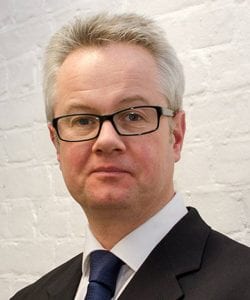
On 4 February 2019, the University of Bristol announced that it had been awarded funding for nine Centres for Doctoral Training from the Engineering and Physical Sciences Research Council (EPSRC), a record boost of over £50 million to train the next generation of highly-skilled researchers across the University. For more information about the announcement and a full list of the CDTs awarded, make sure to check out the University of Bristol website.
In order to find out more about these new CDTs, and the people behind them, the Jean Golding Institute will be interviewing a number of CDT Directors in our latest blog series.
In the first blog of our new series, Guy Nason, Professor of Statistics and Director of the Computational Statistics and Data Science (COMPASS) CDT, has spoken to us a little bit about his CDT.
JGI: Can you tell us a bit about your Centre for Doctoral Training?
COMPASS is a CDT providing training on Computational Statistics and Data Science. It is going to be a unique centre that provides cutting-edge training in the latest statistical methods, meshing that with state-of-the art computing and dripping in with a diverse range of other training opportunities (responsible innovation, entrepreneurship, etc). A key goal is to supply excellent people to meet the massive demand arising from academia, industry and government as part of the ‘data science revolution’.
JGI: What are you most excited about in your new CDT?
In the wild, professional research statisticians are found in all areas. COMPASS has expert research statisticians and other statistical experts in many places including in the Bristol School of Medicine, School of Education, Faculty of Engineering and other colleagues in Science, and we are growing that number. We have a large, and growing, list of excellent external partners: e.g. security companies who are interested in statistical methods arising in medical statistics, as some of the issues are similar. A number of our projects will cross departmental boundaries and we are open to working with anyone.
JGI: What are you looking for in applicants to the doctoral training programme?
Academic excellence, background in highly numerate disciplines (maths, statistics, yes, but also theoretical computer science, physics, econometrics, etc). Also, keen on team workers, tenacity and excellent communication skills.
JGI: How do people find out more about your CDT?
Please visit our website.
JGI: What are your main research interests?
My main research interests are time series analysis, statistical science, official and government statistics.
JGI: Can you give a brief background of your experience?
Originally, my research was in theoretical statistics, but over the years I have gradually got more interested in areas where my knowledge could be used in applied areas, and currently this is official and government statistics. It may sound dry, but such statistics, such as inflation, have an enormous impact on the lives and wellbeing of citizens.
I have always been interested in and passionate about teaching. I trained as a schoolteacher with a PGCE and have worked hard on teaching ever since.
JGI: What are the big issues related to data science / data-intensive research in your area?
In my area (time series) I’m always struck by how much we don’t know, rather than what we do and quite impressed by those who attempt to analyse data with inappropriate methods! Good examples are the lack of methods to deal with irregularly-spaced or nonstationary time series. People routinely, erroneously, analyse their data with standard methods, without thinking whether they are appropriate. Statisticians have been called “methodological terrorists”, but I prefer to think that statisticians are just interested in getting it right.
JGI: Can you tell us of one recent publication in the world of data science or data-intensive research that has interested you?
Several things. However, Andrew Gelman’s blog is always a good read.
JGI: How interdisciplinary is your research?
Extremely. John Tukey (one of the inventors of the fast Fourier transform, and a leading statistician) said that the advantage of being a statistician is that you get to play in everyone’s back yard. Statistics gets involved in many, many areas.
JGI: What’s next in your field of research?
In time series, I think there will be much more collection, modelling and analysis of series that are collected at multiple sampling rates. If your series gets boring, then reduce the sampling rate; if it gets exciting, then increase it. We will be developing the methods to do this, and econometrics is ahead of the game here. I’m also interested in cases where your sampling rate is probably not enough to properly acquire all the information in your series.
JGI: If anyone would like to get in touch to talk to you about collaborations / shared interests, how can they get in touch?
Email – but you will find all statisticians massively overloaded. Our methods are popular, so we get asked to join in many projects.
Upcoming posts
Make sure to keep an eye on the JGI blog for more posts in this series in the coming weeks. If you enjoyed this blog, don’t miss our other series, including ‘Introducing the Turing Fellows’, which kicked off with a post featuring Iván Palomares Carrascosa earlier this month, and our ‘Spotlight on Data’ series, the latest of which focussed on Rebecca Barnes’ work with the ‘One in a Million: A study of primary care consultations’ dataset.

